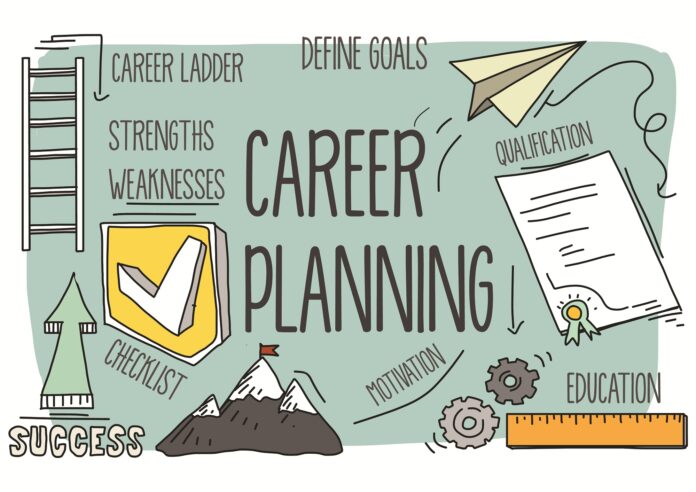Planning and knowing what you want to achieve and when might be the difference between success and failure in your job. Planning is the key. Therefore, it’s vital to have a strategy in place to know exactly what steps to take to get to your desired destination.
However, you may feel overwhelmed or lost when navigating the world of career planning. But with the right guidance, it becomes a straightforward and rewarding process.
This step-by-step guide will show you how to succeed in career planning. You’ll learn about some of the most important things to consider when mapping out your job path and how to ensure you’re on the right track. So, if you’re ready to take the next step in your professional journey, let’s get started.
Step #1. Identify Your Skills, Interests, and Values
Before diving into specific professions, you should first understand your skills, interests, and values. This will help you identify what types align with your strengths and passions.
Here are some tips for identifying these factors:
-
Skills

Make a list of your hard and soft abilities. Hard skills are technical abilities learned through education or training, while soft skills are interpersonal and communication abilities. Write down a list of your skills and reflect on which ones you enjoy using and feel confident in.
-
Interests
Consider what activities or subjects you enjoy outside of work or school. Think about what you would be doing if you had unlimited free time. Ask yourself what topics you’re curious about and what motivates you.
-
Values
Identify what’s important to you. Do you prioritize work-life balance, flexibility, or financial stability? Do you want to make a difference in the world, work with a specific type of population, or have opportunities for growth and advancement?
By reflecting on your skills, interests, and values, you’ll be better equipped to narrow your options and find a job that aligns with your personal and professional goals.
Step #2. Research Potential Careers

Once you clearly understand your skills, interests, and values, it’s time to start researching potential careers that align with those attributes.
Start by using online resources, such as work assessment tools and job search websites, to explore various options. Look at job descriptions, salary ranges, and educational requirements to get a better idea of what each role entails. You may also want to speak with professionals in fields that interest you to gain more insight into what the day-to-day work involves.
In addition to online research, attend trade fairs, conferences, and other networking events to meet professionals and learn more about their industries. This can give you a firsthand perspective on what it’s like to work in a particular field and help you make informed decisions about your professional advancement.
Keep in mind that professional paths may not always be linear and that you may need to explore multiple options before finding the right fit. Be open to exploring new industries and roles, and don’t be afraid to ask mentors or counselors for advice.
Step #3. Create an Action Plan

Once you have identified your skills, interests, and values and have researched potential careers, it’s time to create an action plan to achieve your goals. An action plan outlines the steps you need to take to reach your objectives.
Here’s how to create an effective action plan:
-
Write Down Your Goals
Start by writing down your employment goals. Aim for SMART goals, which stand for specific, measurable, achievable, relevant, and time-bound. For instance, rather than stating that you desire to succeed, specify how much you want to earn or what position you want to achieve.
-
Break Down Your Goals into Smaller Steps
Next, break down your goals into smaller, manageable steps. This will keep you inspired and committed to achieving your objectives. For example, if your goal is to become a project manager, your steps might include getting certified in project management, gaining experience in a related field, and networking with other project managers.
-
Assign Deadlines to Your Steps
Once you have identified the steps you need to take, assign deadlines to each of them. This will help you stay on track and hold yourself accountable. Be realistic with your deadlines and adjust them if necessary.
-
Prioritize Your Steps
Decide which steps are the most important and prioritize them accordingly. You’ll be able to maintain your focus and prevent getting overloaded by doing this.
-
Create a Schedule
Create a schedule that includes the steps you need to take, deadlines, and any other useful information. Make sure you keep your schedule updated and refer to it regularly.
Step #4. Network and Seek Mentorship

Networking and mentorship are critical components of career planning and development. Building strong professional relationships can help you access job opportunities, gain industry insights, and receive support and guidance throughout your journey.
Start by identifying people in your network who can offer valuable advice and support. To find out more about their viewpoints and experiences, get in touch with former coworkers, teachers, and business people. To grow your network and meet like-minded people, attend industry events, and join professional organizations.
In addition to networking, seeking mentorship is another great way to gain support and guidance. A mentor can offer insights and industry knowledge that can help you grow professionally. Look for individuals with experience in your field of interest and willing to share their knowledge and expertise.
Turn to B2B contact data providers to connect with industry professionals and mentors. Leadar, for instance, will allow you to search for professionals by industry, job title, and location, making it easy to find the right person to connect with.
Step #5. Gain Experience and Continuously Learn

Now that you’ve created an action plan and begun networking and seeking mentorship, it’s time to gain experience and continuously learn in your chosen field. Employers value experience and ongoing education, which can make a big difference in your job success.
One way to gain experience is through internships or volunteering in your desired field. Not only does this provide hands-on experience, but it also allows you to make connections and potentially lead to job opportunities.
Another way to gain experience is through freelance or side projects. This can provide valuable experience and help build a portfolio and showcase your skills to potential employers.
In addition to gaining experience, continuous learning is also important. Stay up-to-date on industry trends and changes, take courses or workshops to enhance your skills, and seek feedback from mentors or colleagues.
Be brave and try new things; don’t be afraid to leave your comfort zone, which can lead to new perspectives. Keep a positive attitude and stay open to learning and growing in your chosen job.
Step #6. Monitor and Re-evaluate Your Progress

Monitoring your progress will help you evaluate your success and identify any necessary adjustments that need to be made.
One effective way to monitor your progress is to keep a journal. Write down your goals and track your accomplishments regularly. Make a note of any challenges you encounter and how you overcame them. Use this information to create new strategies to help you stay on track.
It’s also essential to re-evaluate your goals regularly. This means taking the time to assess your priorities, values, and professional aspirations. Are you still interested in the same career path? Have your priorities shifted since you first started planning? Answering these questions will help ensure your action plan remains relevant and effective.
Finally, don’t forget to celebrate your successes along the way. Recognizing your accomplishments can help boost your confidence and motivation, keeping you on track to achieving your goals.
Final Thoughts
Career planning is an essential part of achieving your professional goals. With the right mindset and effort, you can set yourself up for success and achieve the profession of your dreams.
Remember, the journey to success is not a straight line, but by having a plan in place, you can navigate any challenges and setbacks along the way.







